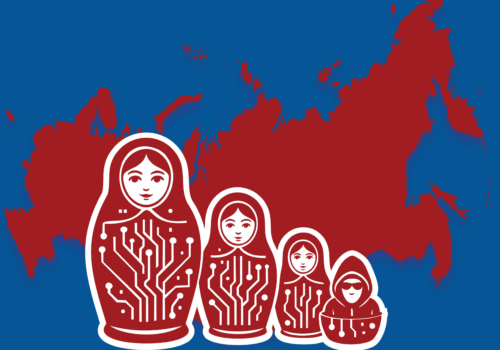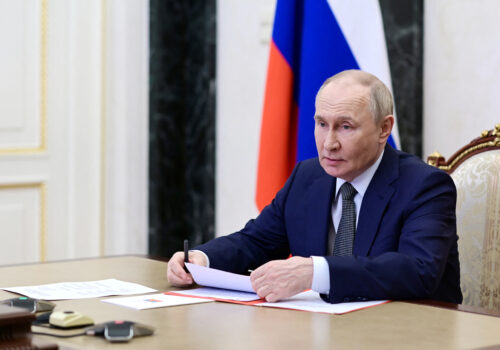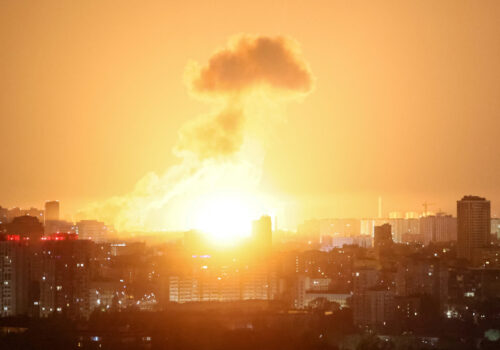Putin continues to thwart Trump’s goal of achieving a cease-fire
This is part of a series of regular assessments of the efforts, spearheaded by the Trump administration, to achieve a negotiated end to Russia’s war on Ukraine. Read the previous entry in the series here.
Both the Kremlin and the White House statements on the two-hour May 19 phone call between presidents Donald Trump and Vladimir Putin suggest that the results were meager—and Trump may be backing off some of his tough rhetoric on Putin. On Truth Social, Trump said: “Russia and Ukraine will immediately start negotiations toward a Ceasefire and, more importantly, an END to the War. The conditions for that will be negotiated between the two parties, as it can only be, because they know details of a negotiation that nobody else would be aware of.”
For his part, Putin labeled the conversation “informative and helpful,” but he also said that the “root cause of the issue” must be addressed. That means Ukraine must agree to the draconian terms that Russian negotiator Vladimir Medinsky recently set down in Istanbul, such as the demilitarization of Ukraine and Ukrainian troop withdrawals from Ukrainian territory Russia has “annexed” but does not occupy. In short, this represents zero movement toward ending the fighting since the Ukraine-Russia talks last week in Istanbul.
“I believe it went very well,” Trump said of the call with Putin on Monday. Trump’s positive characterization of the exchange is odd because last week, when Putin chose not to show up at the talks in Istanbul that he had proposed—talks that Trump encouraged Ukrainian President Volodymyr Zelenskyy to attend—Trump justified Putin’s capriciousness by saying that, of course Putin did not show up because he, Trump, was not there. The US president asserted that “Nothing’s going to happen until Putin and I get together, okay?” In preparation for the call with Putin this week, Trump wrote on Truth Social: “THE SUBJECTS OF THE CALL WILL BE, STOPPING THE ‘BLOODBATH’ THAT IS KILLING, ON AVERAGE, MORE THAN 5000 RUSSIAN AND UKRAINIAN SOLDIERS A WEEK, AND TRADE.”
Yet at the end of that call, Trump was upbeat about the resumption of Russian-Ukrainian talks, and he was silent on the need for him to meet with Putin. This outcome is no surprise because Putin continues to thwart Trump’s stated goal of achieving an immediate end to the shooting. Putin underscored this Sunday night with the launch of the largest drone attack on Ukraine—over two hundred drones—since the start of the invasion.
In the days ahead of the call, US Vice President JD Vance and US Secretary of State Marco Rubio noted that if progress toward peace does not actually appear, the United States could “walk away” from the talks. This is a way of putting pressure on the parties. Without explanation, White House Press Secretary Karoline Leavitt said that the administration is frustrated with both sides, even though, as Vance said earlier this month, it is Russia that is asking for too much.
Meanwhile, Zelenskyy and his European partners in the United Kingdom, France, Germany, and elsewhere are proceeding with their efforts to place additional sanctions on Moscow, an effort that would be more effective at moving the Kremlin toward an actual cease-fire if Trump worked with this group. At the moment, White House policy does not reflect the view of 61 percent of the American public that the administration’s policy is weak on Putin.
Despite the tentativeness of recent White House policy, it cannot be ruled out that Trump will make good on his promise to achieve a durable peace by putting ample pressure on the party obstructing that outcome. But for now, it is hard to escape the conclusion that Trump blinked.
John E. Herbst is the senior director of the Atlantic Council’s Eurasia Center and a former US ambassador to Ukraine.
Further reading
Tue, May 20, 2025
Unpacking Russia’s cyber nesting doll
Russia Tomorrow By Justin Sherman
The latest report in the Atlantic Council’s Russia Tomorrow series explores Russia’s wartime cyber operations and broader cyber web.
Fri, May 16, 2025
To achieve his goal of a durable peace, Trump must turn up the pressure on Putin
New Atlanticist By John E. Herbst
The Trump administration can only achieve a lasting peace in Ukraine if it makes clear that there will be consequences for Russia’s unwillingness to compromise.
Thu, May 15, 2025
Russia’s aerial attacks on Ukrainian civilians must not go unpunished
UkraineAlert By
Holding Russia legally accountable for the ongoing air offensive against Ukraine’s civilian population is particularly important as this form of total war looks set to make a return, write Anastasiya Donets and Susan H. Farbstein.
Image: Russian President Vladimir Putin meets with journalists following a phone call with U.S. President Donald Trump at the Sirius educational centre for gifted children near Sochi in the Krasnodar region, Russia, May 19, 2025. Sputnik/Vyacheslav Prokofyev/Pool via REUTERS



